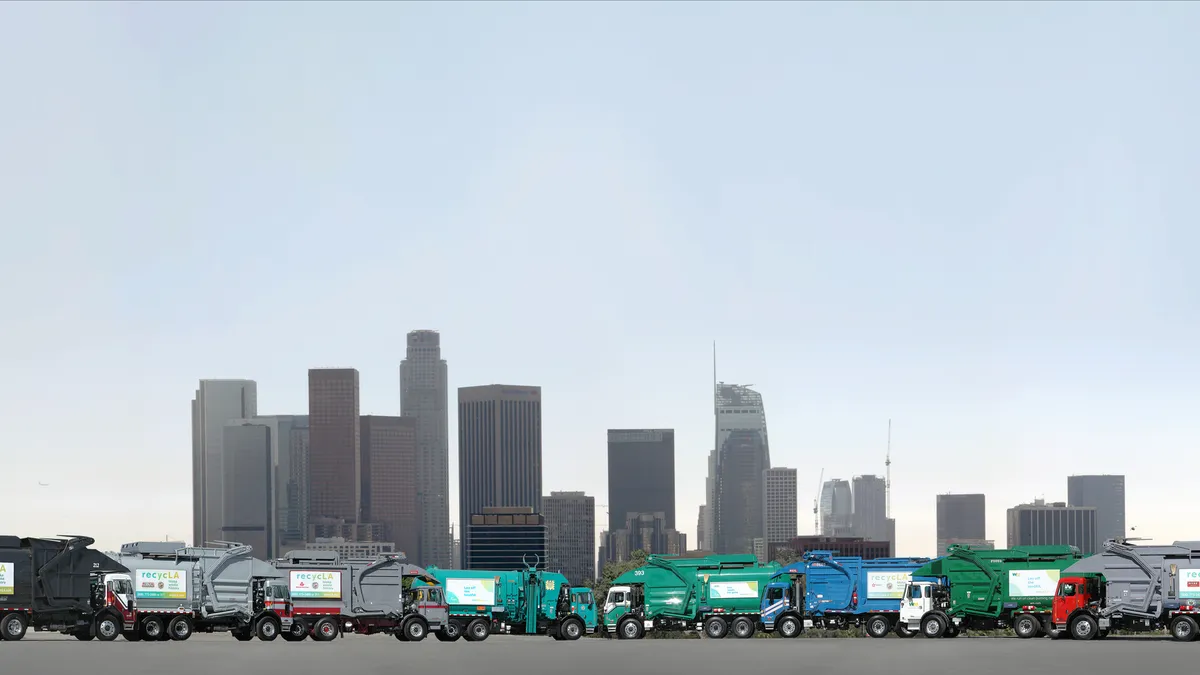Dive Brief:
- Since the recycLA franchise system launched in July, the Los Angeles Bureau of Sanitation (LASAN) has fully transitioned customers in four of the six sub-zones within each coverage area and completed 47,000 waste assessments. An estimated 19,000 have signed service agreements and the remainder were auto-enrolled. The complicated results of this fast-moving process were on full display at a multi-hour Dec. 1 Board of Public Works (BPW) meeting.
- The board heard comments from dozens of property managers, business owners and local advocates. Some shared stories of reduced truck traffic, increased food recovery volumes and lower monthly bills. Others were less positive. Many comments focused on double- or triple-digit rate increases, collection lapses, customer service frustrations and city communication deficiencies.
- LASAN outlined steps it had taken to address these issues and noted that average rates were still comparable within California. The agency has dedicated staff to servicing missed collections, resolving bill disputes and visiting properties to help reduce service fees. According to Director Enrique Zaldivar, his team's mission is to "unequivocally always have the best interest of the customer at the core of how we manage recycLA." The BPW plans to hold a follow-up hearing in February once the transition process is complete.
Dive Insight:
The recycLA concept has been in the works for years, but moved into a period of rapid implementation following approval from the Los Angeles City Council last December. Since then, the city has been working with seven service providers — Athens Services, Waste Management, Republic Services, Universal Waste Systems, NASA Services, CalMet Services and Ware Disposal — to transition more than 70,000 customers into the largest franchise system of its kind in the U.S.
This period has reportedly been chaotic for many, despite the establishment of a 24-hour service line, local district offices and required in-person waste assessments. Many customers have seen longstanding arrangements upended and are concerned that, with only one available service provider per district, their options may be limited. Though the fact that so many accounts have been auto-enrolled — which happens after two months if the customers take no other action — is a sign that some may not be fully maximizing cost reduction options.
New service access or container distance fees were some of the most common complaints at the meeting. An estimated 23% of customers are now paying some type of service fee. LASAN estimates that these fees only comprise 40% of bills for about 5% of customers and is working with them on-site to find solutions.
While the system was designed to make recycling free, property managers repeatedly said tenant education has been difficult and costs often can't be passed on due to rent control. These customers also dispute that their rates will go down once service is "right-sized" and aren't going quietly. A group of property owners is still pursuing a lawsuit and working toward a 2018 ballot initiative that could try to make recycLA a non-exclusive system.
As all of this unfolds, LASAN has recognized that initial communication could have been better. Even some supporters wonder if the seven-month transition period was too ambitious for a change of this scale. However the system turns out once this transition is complete, recycLA may already be a harbinger of the arguments to come in other cities. Interest is growing in new ways to maximize resource recovery through more sustainable methods and labor practices. Whether such an approach is inherently more expensive, and whether customers are willing to accept that, remains to be seen.















